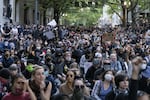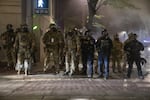Note: This story contains a graphic image of a head injury.
Attorneys for the federal government and a man permanently injured during Portland’s 2020 protests say they’ve reached an “agreement in principle” to settle the case that was set to go to trial next month. They’re working to get the deal approved before high-level officials at the U.S. Department of Justice leave office at the end of President Biden’s term.
Donovan LaBella, 30, was peacefully protesting outside the federal courthouse in Portland on July 11, 2020, when a deputy U.S. Marshal fired a “less lethal” impact munition that struck LaBella in the face, causing brain damage.
Due to the extent of LaBella’s injury, he has a conservator who manages his finances, which is reviewed by a state court judge. Part of the settlement’s delay involves getting a state court judge to review and approve the deal.
James Healey, one of LaBella’s attorneys, said in court Wednesday that the proposed agreement includes an initial cash payment and a stream of income for the next 40 years, though he didn’t specify an amount.
During the hearing, attorneys for the U.S. Department of Justice’s Civil Division told Senior U.S. District Court Judge Michael Mosman that the deal will take months to finalize, potentially stretching beyond the end of the Biden administration.

Donavan LaBella, 26, was shot in the head by a U.S. Marshal and suffered a frontal lobe skull fracture during protests against racism and police violence in Portland. Two weeks later, before being released from the hospital, his mom said he still has cognitive problems and struggles with impulse control.
Courtesy of the family
Attorneys for the Justice Department said the settlement requires sign-offs at some of the highest levels of the agency – a requirement when settlements exceed $4 million. The government’s attorneys also laid out their plan for how they would get the agreement approved if political appointees from the Biden administration were no longer in office.
“If it’s pretty much a done deal the incoming administration will respect the deal,” Stephen Terrell, a trial attorney with the Justice Department told the judge. He also said that both political appointees as well as career employees “are aware and have been involved in the settlement negotiations.”
The night LaBella was injured he held a speaker that was playing music over his head. The incident was captured on video and shared widely on social media, and was covered extensively by news organizations. It served as one of the most high-profile instances of violence when federal law enforcement surged into Portland amid protests against police violence following the murder of George Floyd by an officer in Minneapolis.

Massive crowds gathered in Portland for a fourth evening of protests over the killing of George Floyd in June 2020. Donovan LaBella was peacefully protesting the killing of Floyd in Portland on July 11, 2020, when a deputy U.S. Marshal fired a “less lethal” impact munition that struck LaBella in the face, causing brain damage.
Jonathan Levinson / OPB
Since LaBella was injured, he’s undergone numerous surgeries and suffered what’s known as frontal lobe syndrome. It affects higher brain functioning, such as language, social behavior, planning and motivation. According to a lawsuit filed on his behalf in 2021, the permanent injury to his brain was “equated by medical professionals to a frontal lobotomy.”
Earlier this year, the federal government provided its first account of events, arguing in court filings that the U.S. marshal who shot LaBella used “reasonable and privileged” force. Justice Department attorneys argued the officer — identified in court documents as John Doe 1 — wasn’t aiming for LaBella’s head. Rather, they said, the gas mask the officer wore made it difficult to aim the launcher when they fired the munition.
“Unfortunately, the impact round did not strike Mr. LaBella in the abdomen, where John Doe 1 had aimed,” attorneys for the U.S. Justice Department wrote. “Instead, it struck him in the head. The evidence will show that the fact that John Doe 1 was wearing a gas mask and did not obtain a good ‘cheek weld’ (aligning his eye along the barrel and the sight) are the most likely explanations for this result.”
Mosman canceled next month’s trial and scheduled a hearing in mid-February for an update on the case.

Federal law enforcement officers, along with PPB, dispersed hundreds of protesters from the Justice Center and federal courthouse on the 4th of July during protests against systemic racism and police violence. Donovan LaBella was peacefully protesting the killing of Floyd in Portland on July 11, 2020, when a deputy U.S. Marshal fired a “less lethal” impact munition that struck LaBella in the face, causing brain damage.
Jonathan Levinson / OPB
